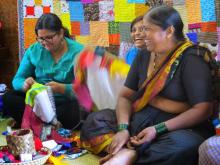Bangalore, India
This program is co-sponsored by English.
India is often known as a country that simultaneously lives in many centuries at once. Straddling the ultra-traditional and high-tech modern, Indian society evidences deeply regressive and surprisingly progressive values which differently affect people's lives across gender, caste, class and region. This program introduces students to an amazing roster of Indian activists, scholars and everyday change-makers who are working to expand the frame of human rights and social justice for poor people, disenfranchised minorities and women.
To better understand how social change takes place, we will focus on the weaving arts as an entry point and lens. We'll spend time understanding how sarees, carpets, clothing, and handicrafts are made, who makes them, how the chain of production has changed over the decades, and what globalization has meant to the people who work in these industries. We'll learn how colonialism influenced the centuries-old weaving and handicraft industries, and consider how globalization, gender, sexuality, caste and class play out in these communities nowadays. Students will participate in site visits to weaving centers throughout South India as well as engage in numerous hands-on experiences with front-line activists and thinkers.
In addition to exploring the weaving arts and Indian society, our program will also foreground the study abroad experience as a site to discuss, question and appreciate. We'll discuss the ethics of going abroad as Westerners, and what it means to grapple with our good intentions and different identities. How might we navigate our privileges with an eye toward justice and dignity toward ourselves and others? How do we "sit with discomfort" productively so we can learn and stretch well, not only during the program in India but even after we return home?
If these conversations sound interesting, please do consider joining us. All students across campus welcome to apply!
- CHID 390: Indian Expressions (5 credits)
- CHID 474: Postcolonial Literatures & Cultural Studies (5 credits)
- CHID 470: Introduction to India (2 credits)
*Note that the fees stated above do not include some additional costs, including, but not limited to: airfare, UW Student Abroad Insurance ($1.64/day), and personal spending money. Remember that these costs will differ by program. Be sure to read our Fees, Financing, and Withdrawal information for details about the fee structure and payment schedule.
